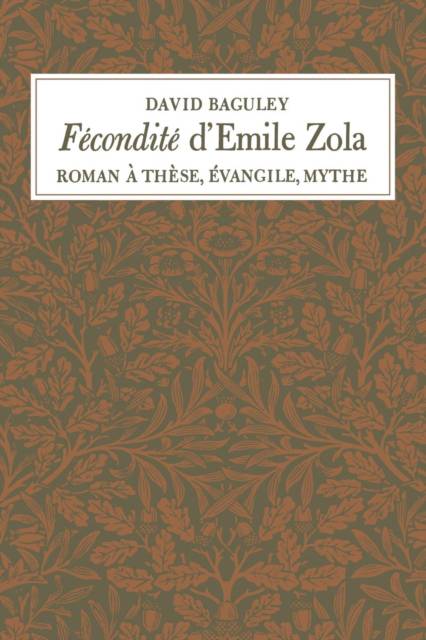
- Afhalen na 1 uur in een winkel met voorraad
- Gratis thuislevering in België vanaf € 30
- Ruim aanbod met 7 miljoen producten
- Afhalen na 1 uur in een winkel met voorraad
- Gratis thuislevering in België vanaf € 30
- Ruim aanbod met 7 miljoen producten
Omschrijving
This historical and critical study of Zola's Fécondité contributes much to an understanding of how the novel came to be written and of its achievements. Like Travail and Verité, the later books in the series Les Quatre Evangiles, Fécondité has not previously received significant critical attention. This study reveals and interprets the less obvious aspects of the work, its biblical and mythical themes, its sources and genesis. It also adds to our knowledge of Zola's later works through the examination of various ideological currents--particularly the impact of Malthusianism, its proponents and adversaries, and who among them Zola read in preparing this book. Fécondité deals with the particular problem of France's declining birth-rate at the end of the nineteenth century and, more generally, with the problem of decadence and cultural renewal.
By the time that he wrote Fécondité, Zola had abandoned his naturalist aesthetic of scientific objectivity, if not also his working methods as a novelist. This study shoes how his didactic concerns continually asserted themselves in the structure and the use of rhetorical techniques in Fécondité.
Specialists in Zola, and others more generally interested in the French culture of the late nineteenth century, as well as the particular demographic problems that Zola treats in the work, and the relationship of literature to primitive mythology, should find this study of particular interest.
Specificaties
Betrokkenen
- Auteur(s):
- Uitgeverij:
Inhoud
- Aantal bladzijden:
- 294
- Taal:
- Frans
- Reeks:
Eigenschappen
- Productcode (EAN):
- 9781442651562
- Verschijningsdatum:
- 15/12/1973
- Uitvoering:
- Paperback
- Formaat:
- Trade paperback (VS)
- Afmetingen:
- 152 mm x 229 mm
- Gewicht:
- 435 g

Alleen bij Standaard Boekhandel
Beoordelingen
We publiceren alleen reviews die voldoen aan de voorwaarden voor reviews. Bekijk onze voorwaarden voor reviews.











